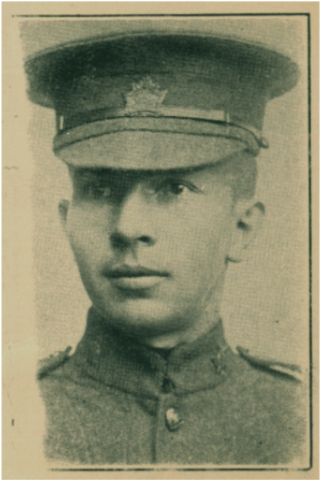
Glasgow, Scotland, Dec 31.
Dear Father and Mother, -
Here I am having a fine time after less than five months in the trenches. Your parcels all arrived O.K. If they were the little ones you said you were sending you had better send the big ones by freight. I got one while we were out on rest and the other on the line. I should have written sooner, but we were on the move for several days, and then I got my pass.
 Mrs.
Cromarty sent me a very nice parcel and another fine one came from Verona
and Co. I was one of the most fortunate for parcels. They couldn't be
improved upon. That system of icing small cakes is very good. Those
cherries sure did hit the spot, and the cigars wee splendid.
Mrs.
Cromarty sent me a very nice parcel and another fine one came from Verona
and Co. I was one of the most fortunate for parcels. They couldn't be
improved upon. That system of icing small cakes is very good. Those
cherries sure did hit the spot, and the cigars wee splendid.
I arrived here yesterday, but it took most of the day to get a room. Then I went to church, St. Mark's, which is much like our large Presbyterian churches in Toronto. I met some very nice people there who invited me out to celebrate Hogmanay tonight. That is some heather custom they practice on the last of the year. I'll let you know all about it if I live through the performance.
This is a fine chance to tell you what I was doing in France. We landed at Boulogne and next morning left for Etaps where we stayed for two days; then we left by train for Cologne Ricourt, and in two days marching we joined the battalion, which was in corps reserve at Gouy Servins. We had about two weeks rest then we went into the line to the left of Lens. that was an awful place for shelling and we lost over 100 men. However, we succeeded in taking a post which six other battalions had tried to do and failed.
I was at Passchendale Ridge, near Ypres, which was as hot a spot as the Canadians were ever in. Just before the boys went over he top most of us signallers were formed into stretcher parties, for many wounded had to be carried to the rear. It would have your hearts good to see our guns pounding Fritz. We carried the wounded about three miles to the dressing station through the worst mud I ever saw, and all the way we were never more than a stone's throw away from the guns. Some of us would get stuck and we would have to help each other out. The continual line of men coming and going made it worse, and all the time the rain was pouring down.
Our battalion went over the top at 6:30 a.m., but were held up by a pill box. In the afternoon we were reinforced by a couple of companies from our support battalion and then we finished the job. There were 75 Germans in the pill box who surrendered to barely 100 of our fellows, so you can easily see who is the best man. The imperials and New Zealanders had each tried that part of the Ridge but couldn't make it.
Over half of our battalion have been hit since I came to France, but in the signallers we have had only two casualties among the thirty men composing the section.
I have since made many trips into the line, but none of them were more eventful than those described above.
Well, this letter has taken a long time to write, so I'll close now.
Your loving son,
H. A. Brinsmead